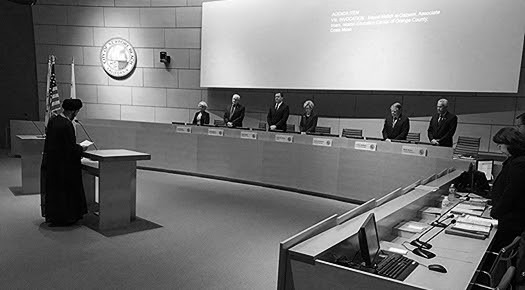
Photo Credits: IECOC
When American Atheists’ Indiana Assistant Director Jama Sullivan asked the city of Connersville if she could deliver an invocation to open up a city council meeting back in January, she was told the speakers had to offer a biblical prayer. There was no actual adopted policy but she, as someone connected to American Atheists, wasn’t the right choice. After that, the mayor, seemingly aware of the problem, put a pause on all invocations until a formal policy could be written. And there it is and its problematic text:
The City Council and Board of Public Works, in relation to the invocation, invites and welcomes the religious leaders of any and all local religions; including but not limited to ministers, priests, chaplains, rabbis, deacons, clerics, imams, elders, and the like (hereinafter “Invocation Speakers”) to participate in providing invocations for the City Council and Board of Public Works. The following shall apply as the City’s policy when it comes to the invocation.
…
The invocation shall be voluntarily delivered by an eligible member of the clergy or religious leader within Fayette County. To ensure that such person is selected from among a wide pool of religious leaders in the community, on a rotating basis, the Invocation Speaker will be selected according to the procedure noted in Section VI below.
The problem is that the adopted policy totally excludes non-religious people from delivering invocation. Despite Sullivan’s warning against adopting the policy, they ignored her and adopted it anyway. American Atheists says it’s downright illegal:
“Precisely because Connersville’s new invocation policy is discriminatory, it is also unconstitutional,” explained Geoffrey Blackwell, American Atheists’ litigation counsel. “The Supreme Court has been clear.”
In Town of Greece v. Galloway (2014), the Supreme Court ruled that volunteer chaplains could open each legislative session in Greece, NY, with a prayer because “the town at no point excluded or denied an opportunity to a would-be prayer giver. Its leaders maintained that a minister or layperson of any persuasion, including an atheist, could give the invocation.”
“I know from my own fundamentalist past that some people are driven by ignorance and fear of nonreligious people and the idea that our very presence is an attack on their religious beliefs. It isn’t,” said Sullivan. “By just participating in the invocation process, I can change hearts and minds about atheists. However, the Connersville government keeps proving it’s more interested in discrimination than inclusivity. It’s unfortunate.”
